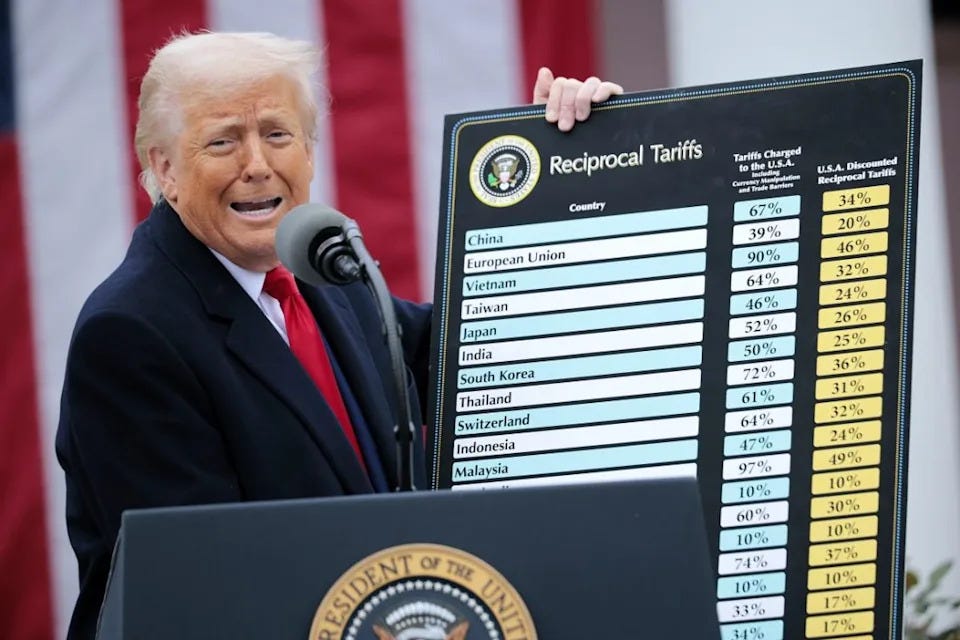First Draft #34: a newsletter on public language
The rhetoric of free trade; levers; Mrs Dalloway; Conclave
What today’s leaders can learn from Victorian free trade campaigners
Richard Cobden led the most successful pressure group in British history. The Anti-Corn Law League, founded in the 1830s, overturned tariffs on imported grain and ushered in a century of free trade. Cobden was also a gifted orator. Benjamin Disraeli called him “the most persuasive speaker I ever listened to”.
With the return of protectionism and the prospect of a full-blown tariff war, free trade advocates could do worse than to borrow a page from Cobden’s playbook. Here are six things politicians can learn from the golden age of Victorian rhetoric:
1. Get better at naming things. Cobden and his allies called the corn laws a “bread tax”. It caught on. Why call something an “alcohol import duty” when you can call it a beer tax? Look for things people value. The more mundane, the better.
2. Balance the moral argument with the pragmatic one. Cobden had grand ideals. He believed that the principle of free trade would bring humanity together, “thrusting aside the antagonism of race, and creed, and language, and uniting us in the bonds of eternal peace”. But he wasn’t always so lofty. He also made the more prosaic point that tariffs make things more expensive. The corn laws put the profits of landed aristocrats above cheap food for the working class. “To have a useful and a prosperous people,” he argued, “we must take care that they are well fed”.
3. Enlist artists. The Anti-Corn Law League commissioned articles, sketches and poetry. They started periodicals with names like The League and The Anti-Corn Law Circular. Ebenezer Elliott, a poet from Rotherham, wrote a series called the Corn Law Rhymes. This is a verse from his poem Caged Rats:
Ye coop us up, and tax our bread,
And wonder why we pine;
But ye are fat, and round, and red,
And fill'd with tax-bought wine.
4. Know your moment. Cobden was campaigning at a time when the Irish famine was on people’s minds. Starvation was a very real prospect. Today’s reality is one of rent hikes, overdrafts and food banks. Use unrest as fuel.
5. Don’t be a snob. Good arguments have popular appeal. Cobden flouted the speechwriting conventions of his time, favouring references to Punch magazine over citations in Latin or Greek. His opponents grumbled that he was “always quoting Dickens”.
6. Use your character. Cobden was a self-made man in an age of aristocrats. He spoke with unforced moral clarity. If you have experience others don’t, use it.
By the time Cobden died he was a celebrity. You could buy a milk jug with his face on. William Gladstone helped to carry the coffin at his funeral. The French ambassador wrote that Cobden was “the representative of those sentiments and those cosmopolitan principles before which national frontiers and rivalries disappear; whilst essentially of his country, he was still more of his time.” A man of his time, indeed. But with much to teach ours, too. @_alice_elliott
Jargon buster: Levers
To soothe us through Trump's global trade rampage, the PM claimed Britain had “a range of levers” we could pull should trouble ensue. An oddly mechanical phrase, and one increasingly fashionable among politicians whose only functioning machinery in 2025 is metaphor. It's no coincidence popular usage of the word “lever” coincides precisely with the rise and decline of British manufacturing, industry, and world-wide hegemony. Once, they denoted actual power. In 1841, at the industrial peak, levers appeared 1,200 times per million words, according to Ngram — quite fitting for the age of coal, steam, and steel. By 1980, usage had plunged to just 80. It continued to dwindle — until, weirdly, now. In 2022, talk of “levers” rose for the first time in decades, climbing to 124 per million — a slight irony, right as Britain limped into the cash-strapped inertia of our post-pandemic era. Perhaps, when we lack real power, we console ourselves with words that mimic it. @cameronjohnharris
Bravo South Western’s admirably plain train refrain
A small victory for plain language which is worth noting. For a long time South West trains, and most other lines, have used the following locution: “welcome to Waterloo Station, where this train will now terminate”, as though the train would blow up on arrival, not understanding that it was the journey, not the train, that was over. Clearly, there has been a directive because this morning the announcer said simply and plainly: “welcome to Waterloo Station, where this train will finish its journey”. @PhilipJCollins1
Mrs Dalloway turns 100
One hundred years ago next month, Virginia Woolf published her fourth novel, Mrs Dalloway (1925): a masterpiece of feeling, thought and technique, and a work that changed English prose fiction forever. For a novel which confines itself to one hot afternoon in Bloomsbury, Mrs Dalloway is dizzyingly capacious in its outlook. Its roving narrative point-of-view takes us in and out of the minds of its characters, so we see the world through their eyes for a few pages or paragraphs, then move on to the mind of somebody else.
Rereading Mrs Dalloway for perhaps the fifth time, I was struck this week by its short sojourn in the head of Mr Dalloway, a Baldwinite backbench Conservative MP:
He stopped at the crossing; and repeated—being simple by nature, and undebauched, because he had tramped, and shot; being pertinacious and dogged, having championed the down-trodden and followed his instincts in the House of Commons; being preserved in his simplicity yet at the same time grown rather speechless, rather stiff—he repeated that it was a miracle that he should have married Clarissa; a miracle—his life had been a miracle, he thought; hesitating to cross. But it did make his blood boil to see little creatures of five or six crossing Piccadilly alone. The police ought to have stopped the traffic at once. He had no illusions about the London police. Indeed, he was collecting evidence of their malpractices; and those costermongers, not allowed to stand their barrows in the streets; and prostitutes, good Lord, the fault wasn’t in them, nor in young men either, but in our detestable social system and so forth…
How well Woolf captures the ironic gulf between certain politicians’ grand stated ambitions (to “champion the downtrodden”!) and their “hesitating” inertia when it comes to acting on them (we must “collect” more “evidence”). “This is a changing and completely new world” said Keir Starmer at Jaguar Land Rover earlier this month; our “old assumptions [...] simply no longer apply.” This government will “fight for the future”, he said. So they’re introducing “more flexibility into EV mandates.” Stirring stuff.
In third-person free indirect discourse in fiction, the style a character thinks in tells you who they are. Richard Dalloway’s incurious observations, benign paternalism and above all his over-simple view of the world are everything the socialist Woolf despised in politics. His vague reference to “our detestable social system and so forth” confirms another character’s earlier opinion: he is a man who has “read nothing, thought nothing, felt nothing.” In politics, as in fiction, our style tells our readers and listeners who we are. Platitudes like the world is changing or further, faster growth speak volumes. They tell voters you think nothing, believe in nothing, offer them nothing. @HibbertLizzie
Conclave’s deep faith in rhetoric
The timely film adaptation of Robert Harris’s Conclave casts light on the arcane conventions of Vatican succession. It is also a hymn to the persuasive arts. The film, named after the assembly of cardinals who gather for the election of a Pope, pays deepest reverence not to the divine or to the Church but to the power of rhetoric. The cardinals are an impious bunch. In the conclave, factionalism and personal ambition foment toxic gossip and skulduggery. What does it take to bring this unholy rabble into the light? A speech, of course. Or several. The film’s most memorable oration, delivered by Ralph Fiennes’ Cardinal Thomas Lawrence, is itself a kind of argument for deliberative rhetoric: “Certainty is the great enemy of unity. Certainty is the deadly enemy of tolerance. If there was only certainty and no doubt, there would be no mystery and therefore no need for faith.” And, he might add, there would be no persuasion and no democracy. @AlexDymoke
Language and beyond
We’re big fans of the novelist David Szalay here at Draft towers. His almost novel (it’s more short story collection) All That Man Is just missed out on the Booker in 2016 but has since gained a cult following. Szalay’s latest, Flesh, which came out last month, is just as good: spare, propulsive, acutely observed. Read it.
How will a massive acceleration in AI adoption affect the global economy and society? The New Yorker’s John Cassidy explores this question through the prism of the mechanisation of mills in 18th and 19th century Britain.
An enjoyable look at Hollywood’s depictions of the Papacy.
A sign of the times: The Athletic, the New York Times-owned sports website which employs many of the best football journalists, has just appointed its first dedicated football finance writer. To mark the employment of chartered accountant Chris Weatherspoon the site published a glossary of football finance terms, from amortisation and agent fees to PSR and Squad Cost Ratio.
A breezy essay gives fourteen reasons why manufacturing will be so hard to bring back to the US. China has a more educated workforce, cheaper electricity and better robots, to name a few.
The Economist recently published an excellent profile of Tyler Cowen, the writer, thinker and professor once described by the FT as “America’s most original economist”. Cowen’s viral 2011 essay The Great Stagnation examined the macro-economic factors behind stagnant growth and wages in the US since the 1970s. Today, however, he’s more bullish, thanks to the enormous productivity gains he thinks will come from AI. The profile does a good job of explaining why Cowen is an important figure, but also what makes him an appealing character who inspires devotion in smart people. I was still thinking about the piece when YouTube served up a wide-ranging interview with Cowen on how writers can get the most out of AI. There are many experts on writing and many on AI but Cowen is a rare thing — an expert in both. The discussion mostly leaves aside the big questions and prognostications that tend to come up on this subject. Instead, it’s a highly practical chat about how to get the most out of AI as a writer — from someone who really understands and values good writing.
New from us
Phil talks Reform’s plan for power on Prospect Magazine’s podcast
Lizzie’s essay on the quest to discover the age of earth
And if you’ve recently jumped ship from X to Bluesky, you can find us on the platform here
Follow us
Last thing…
At The Draft we’re specialists in writing and rhetoric. We help businesses and public figures make their case more persuasively. If you could use our help, get in touch. And if you enjoy First Draft, forward it on. Thanks for reading.






